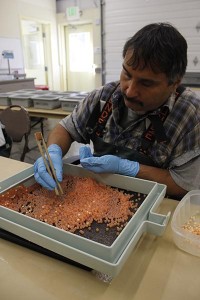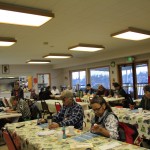
Jeannie Briones, Tulalip News staff writer
TULALIP, Wash. – Tulalip tribal member Stan Jones III has lived on the reservation since 1994 and has seen firsthand the increase in crime and drugs. In an effort to combat this rising problem, he organized a neighborhood community watch to urge the community to work together to help make Tulalip stronger by fighting against crime and drugs.
“It started off as a Facebook group, trying to get people together as far as awareness in the area,” said Stan. “I want the community to be aware of the problem that is occurring and to stand up against it.”
Stan decided to get the community more involved by establishing monthly neighborhood watch group meetings, where community members gather to provide each other with direct support, encouragement, and discussions on current issues in the community.
The first meeting, held November 17, 2012, at the Tulalip Administration Building, consisted of guest speakers, educational information on safety, discussions on crime tips and feedback from the community.
“The last meeting went well, we had two tribal police officers there and Ross Fryberg was able to give out a ton of information,” said Stan.
The foundation of these meetings is to bring awareness to community members and to work together to re-establish control over the neighborhood by being aware of unusual activities and reporting crimes, promoting an increase in safety, which reduces crime and drugs in the area.
“Meetings cover education, prevention, help or resources, empowerment, and safety and even these small steps push out a level of organized crime,” said Stan.
Another goal of the watch group is to educate the community on ways to report suspicious activities and basic home maintenance, such as installing security lights, updating locks, and installing a home alarm system.
“Burglars want to spend no more than a minute breaking into a home. A simple thing like dead bolting the door is important, as are putting a piece of wood in the window, clearing shrubs and bushes around your home, and replacing dead light bulbs, “ said Stan.
Community participation in neighborhood watch groups is a positive way for community members to play a part in the fight against crime and bond through community involvement. Community members can make a difference and see a decrease of opportunities for criminals to commit crimes and drug use.
The next Neighborhood Community Watch meeting will be held January 22nd at the Mission Highland Community Center at 5:00 p.m.
For more information about the group and how to get involved, please contact Stan Jones III at 425-750-2331. You can request to join Tulalip Community Watch on Facebook to receive helpful tips to help keep you and your family safe.
Jeannie Briones: 360-716-4188; jbriones@tulaliptribes-nsn.gov













